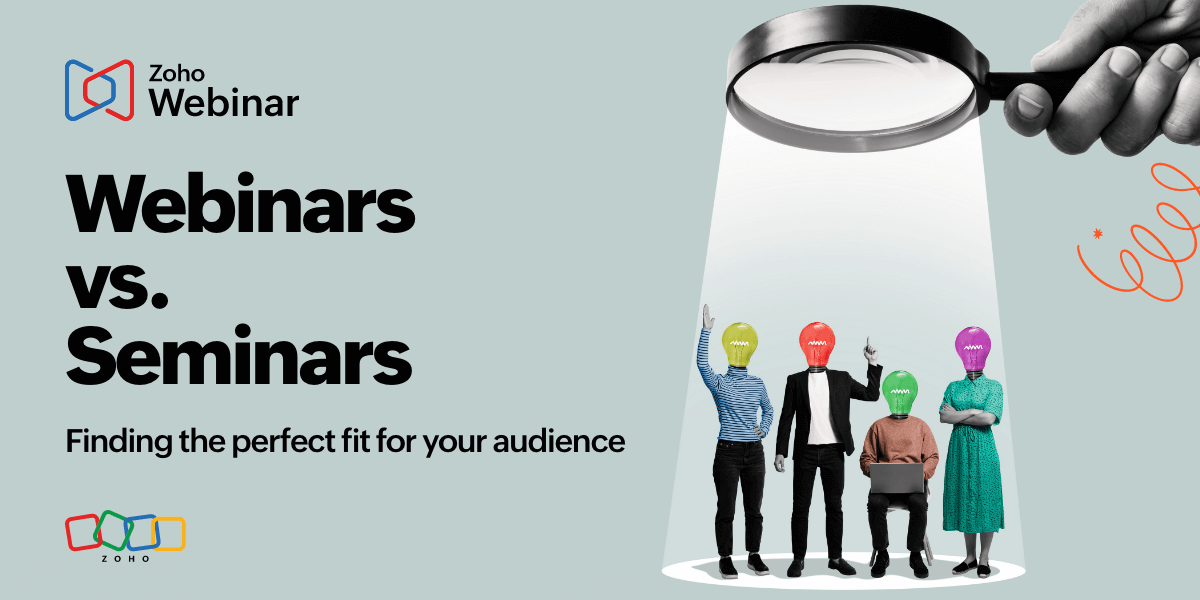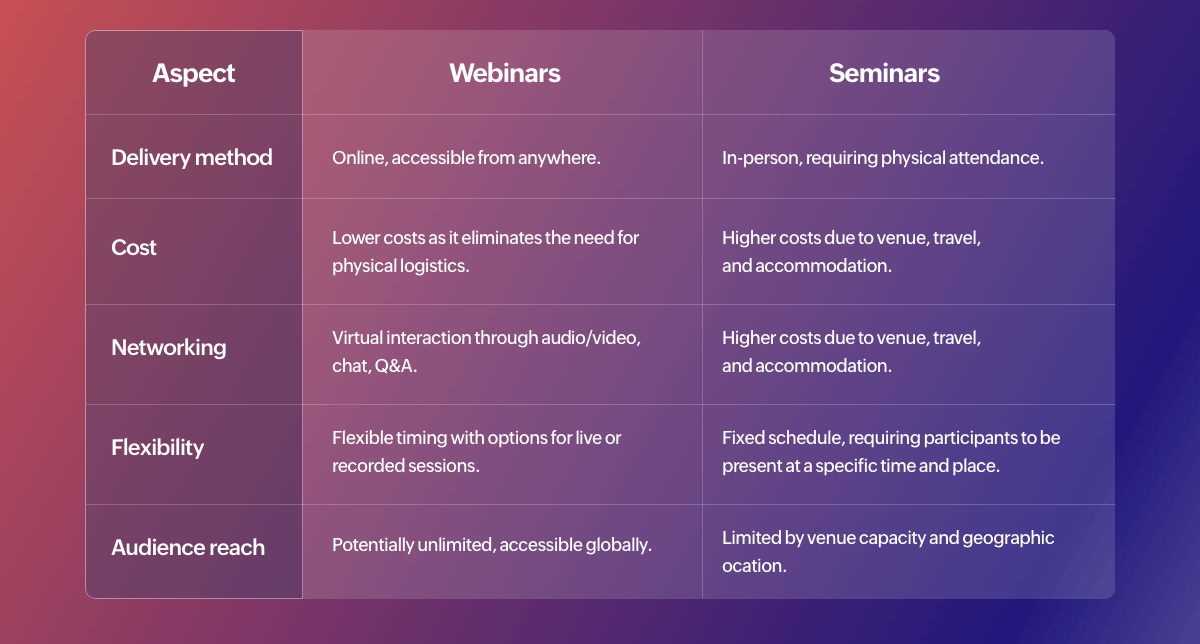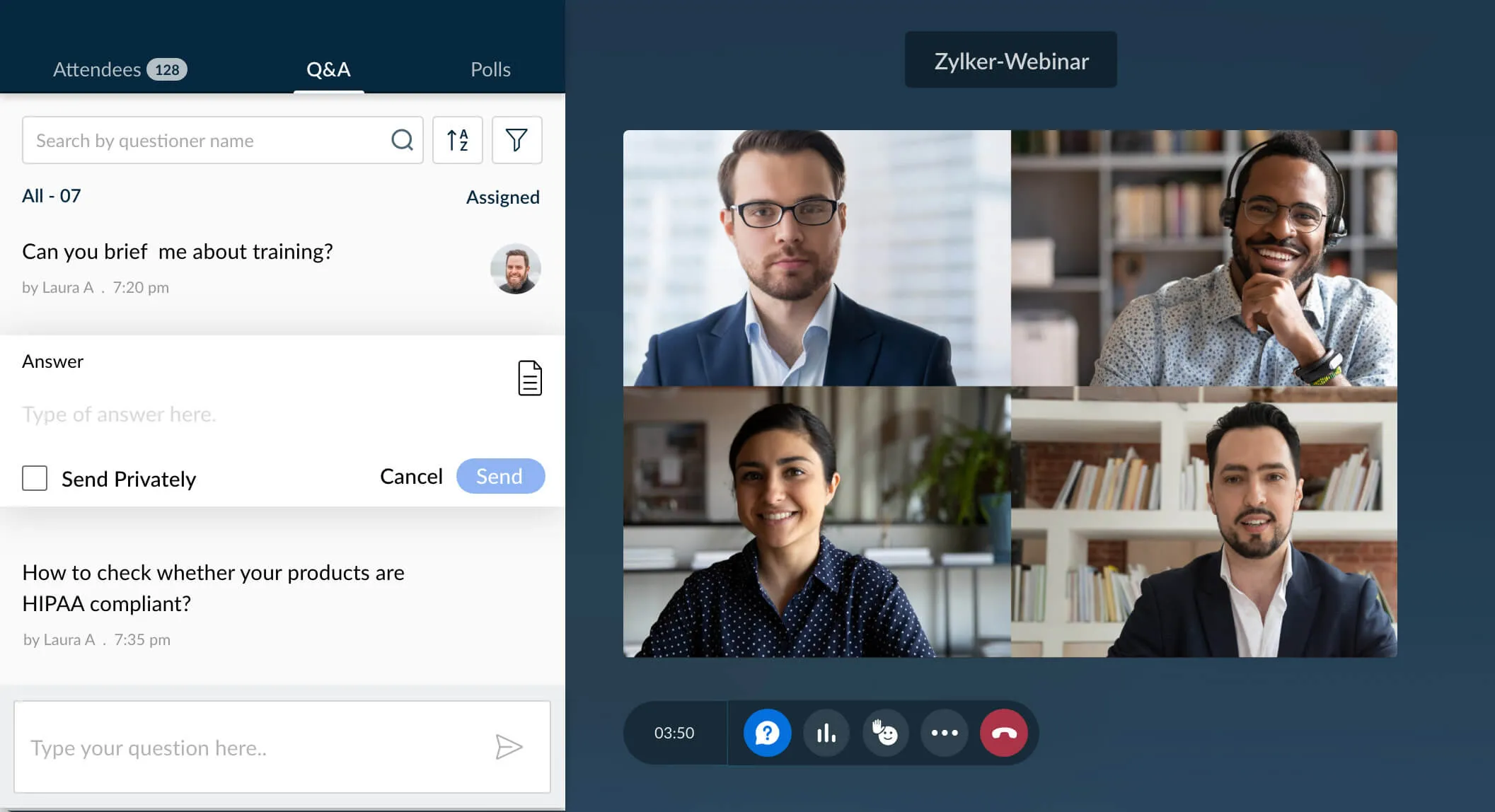- HOME
- Webinars vs. Seminars: Key differences & benefits
Webinars vs. Seminars: Key differences & benefits
- Last Updated : December 5, 2025
- 1.4K Views
- 4 Min Read
In today's interconnected world, the ways we gather, learn, and share knowledge have evolved significantly. Traditional in-person seminars are being complemented and sometimes replaced by online webinars. This article explores the key differences between webinars and seminars, helping you decide which is best for your needs.

What is a webinar?
A webinar, or web-based seminar, is a virtual event conducted over the internet, allowing attendees to join from any location. Webinars are typically interactive and can include presentations, lectures, or workshops.
Key features of webinars
- Accessibility: Attendees can join from anywhere with an internet connection.
- Cost-effective: Reduces the need for travel and accommodation expenses.
- Scalability: Can accommodate a large number of participants simultaneously.
- Recordable: Sessions can be recorded for later viewing and reference.
Examples of webinars
- Live webinars: Real-time online presentations with interactive Q&A sessions.
- On-demand webinars: Pre-recorded sessions available for viewing at any time.
- Interactive workshops: Virtual workshops with live demonstrations and attendee engagement.
What is a seminar?
A seminar is a formal group discussion where individuals gather to discuss specific topics, usually led by an expert or a group of experts. Seminars can be academic, professional, or educational in nature.
Key features of seminars
- In-person interaction: Participants and presenters are physically present in the same location.
- Networking opportunities: Allows for face-to-face networking and direct interaction.
- Hands-on activities: Often includes workshops, group discussions, and hands-on activities.
- Focused environment: Provides a dedicated space away from daily distractions.
Examples of seminars
- Academic seminars: University-hosted events where researchers present their findings.
- Professional development seminars: Industry-specific events for skill enhancement and networking.
- Educational workshops: Interactive sessions focusing on skill-building and knowledge transfer.
Webinars vs. Seminars: What's the key difference?
Webinars and seminars may sound similar, but they cater to different formats and audiences.
- Webinars are conducted online, allowing attendees to join from anywhere. They are ideal for global reach, with interactive tools like Q&A, live polls, and chat.
- Seminars are typically held in physical locations, requiring attendees to travel. They are best suited for localized, in-person networking experiences and sessions.

The primary difference lies in accessibility and format: webinars excel in convenience and scalability, while seminars focus on face-to-face engagement. Both webinars and seminars offer valuable opportunities for learning and professional growth. By aligning your event format with your goals and audience preferences, you can maximize the impact and effectiveness of your educational initiatives.
Why should you choose Webinars over Seminars?
There are several benefits of hosting webinars that traditional seminars can’t match:
- Global reach: No geographical boundaries; connect with an audience worldwide.
- Cost efficiency: Eliminate travel and venue costs, making webinars budget-friendly.
- Real-time engagement: Use features like live polls, Q&A, and chat for instant feedback.
- Data insights: Track attendance, interaction, and performance metrics to measure success.
- On-demand content: Record and share webinars, extending their lifespan and boosting engagement.
By choosing webinars, you can modernize your approach and connect with your audience more effectively.

How to host a webinar or virtual seminar?
Scheduling and organizing a successful webinar or virtual seminar is simple with Zoho Webinar. Here's how:
- Plan your topic and audience: Define your webinar’s goal and target audience. Ensure the topic is relevant and engaging for the attendees.
- Choose the right platform: Opt for Zoho Webinar—a feature-rich, user-friendly tool. It supports live webinars, on-demand sessions, and interactive features like Q&A and polls to keep your audience engaged.
- Promote your webinar: Use email campaigns and social media to spread the word. With Zoho Webinar, you can create personalized email invites to attract more participants.
- Engage during the webinar: Leverage Zoho Webinar’s interactive tools to connect with attendees. Use screen sharing, file sharing, and even livestream your session to get maximum attendance.
- Follow up with attendees: Zoho Webinar provides analytics and attendee reports to help you understand your audience better. Send recorded sessions and thank-you emails to keep the conversation going.
By hosting your webinars with Zoho Webinar, you get the advantage of seamless functionality, powerful engagement tools, and actionable insights—all designed to help you achieve your goals effortlessly. Learn more on how to create and host a webinar.
Webinar vs. Seminar: When to choose one?
Choose webinar when you want to:
Reach a large geographically dispersed audience without physical space limits, enabling global participation from anywhere with internet access.
Offer flexibility through recordings and on-demand replays for attendees who can't join live.
Choose seminar when you want to:
Foster deep personal interactions, networking, and relationship-building through face-to-face discussions and organic connections.
Conduct hands-on activities, workshops, live demonstrations, or group exercises that require physical presence.
Key Takeaways:
Webinars excel in scalability, cost-effectiveness, and global accessibility, making them ideal for broad outreach, lead generation, and flexible on-demand delivery through recordings and engagement tools like polls and chat. Seminars, by contrast, foster deeper personal connections, hands-on activities, and immersive networking in distraction-free in-person settings, best for building trust and complex discussions. Ultimately, align your choice and choose the format that best suits with your event goals.
Frequently Asked Questions
What is the difference between a seminar and a webinar?
A webinar is an online event allowing remote participation via internet from anywhere, while a seminar is an in-person event requiring physical attendance for interactive discussions and networking.
Is a webinar an online seminar?
No, a webinar is not exactly an online seminar; seminars emphasize in-person, hands-on engagement, whereas webinars focus on online delivery with digital interactivity, though both share similar goals.
What is the difference between a webinar and a virtual seminar?
A webinar is an online event broad audiences, featuring tools like polls, Q&A, and chat for controlled interactivity, often with recordings for on-demand access. A virtual seminar is an in-person seminar digitally, emphasizing deeper discussions.
When is it better to choose a webinar instead of a seminar, and vice versa?
Choose a webinar for large, remote audiences and flexible digital interaction; pick a seminar for in-person networking, hands-on activities, and personal engagement.
Which factors you should consider before hosting a Webinar?
Zoho Webinar excels by scaling up to 5,000 attendees, interactive features, including polls, Q&A, chat, screen/file sharing, and on-demand replays, via browser-based access with no downloads needed. Built-in analytics track registrations, engagement, and conversions to maximize ROI. This makes Zoho Webinar the ideal choice for efficient, scalable events aligned with your webinar strategies.